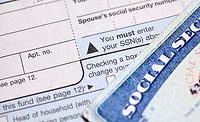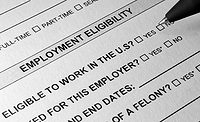Legally Speaking: Paying an Employee Who Does Not Have a Social Security Number
Many employers of newly hired young and/or foreign workers are faced with the dilemma of paying them before the workers are able to obtain a Social Security number (SSN). Despite the widespread misunderstanding that it is illegal for an employer to pay an employee who does not have an SSN, there is nothing in the law prohibiting it.

Many employers of newly hired young and/or foreign workers are faced with the dilemma of paying them before the workers are able to obtain a Social Security number (SSN). Despite the widespread misunderstanding that it is illegal for an employer to pay an employee who does not have an SSN, there is nothing in the law prohibiting it. On the other hand, employers of workers lacking SSNs are still required to pay them. (Sorry, roofing contractors.) Luckily, federal law provides guidance on how to address this situation.
In order to increase homeland security after 9/11, the Social Security Administration (SSA) has taken extra steps to ensure the integrity of SSNs. These changes have affected the way the SSA assigns numbers and issues cards and in some cases have caused delays of several weeks or months in receiving a number. When a foreign worker applies for an SSN, the SSA verifies his or her employment authorization documents directly with the Department of Homeland Security (DHS) if the person is an alien. Most applications can be verified immediately, but there can be delays or problems due to data entry errors, similarity of names, etc. These can be time-consuming to correct. Although most employers want an employee to have an SSN on the date of hire, especially when payroll services are outsourced, the SSN is not required to start employment. IRS regulations require newly hired employees, on the day they start working for an employer, to:
This information must be furnished on Form SS-5, if a copy of the form is available. (It can be downloaded from www.ssa.gov/online/ss-5.html.) The furnishing of such a Form SS-5 or other statement by the employee to the employer does not relieve the employee of his obligation to make an application on Form SS-5 and file it with the SSA. The Internal Revenue Code requires an employee to apply for an SSN within seven days of beginning work for taxable income. An employer would be well advised to confirm this has been done, not only for ease-of-payroll-related reasons but also to show a good faith effort if the federal government ever comes calling.
The Immigration Reform and Control Act (IRCA) prohibits employers from requiring the presentation of a Social Security card by a potential employee in order to establish employment eligibility. A Social Security card is listed on List “C” of the I-9 Employment Eligibility Verification form and an employer can accept a Social Security card in conjunction with another document included on List B of the I-9 but cannot mandate an employee provide specific documents from these lists. This cannot be emphasized enough: Employees can choose to provide an employer with any document from List A or any document from List B and any document from List C. An employer will lay the groundwork for an unfair labor practice if it mandates a new employee provide it with any specific documents listed on the I-9 Form. Such a practice will increase the odds of an unexpected (and ultimately expensive) visit from the U.S. Department of Labor and/or Department of Justice.
The Social Security Administration has emphasized the importance of an employer having an SSN for each employee at the time of annual income tax reporting. Income tax withholding is not associated with SSNs at the time of incremental payments (depending on the size of the company and the compensation paid, this may be transmitted to the Federal Reserve weekly, monthly or quarterly). If an SSN has been applied for but not received at the time of W-2 issuance, which summarizes all FICA and income taxes paid, then employers that paper-file may write “applied for” in box “d” and magnetic tape filers may enter all zeros in box “4.”
While most employers would prefer their new hires to have Social Security numbers, there is no legal requirement for this. There is, however, a requirement that employees at least apply for an SSN within seven days of beginning employment. Employers should note that this does not excuse them from failing to obtain an SSN from a worker after employment has begun. They must take all reasonable steps to ensure all of their employees have obtained their SSNs in accordance with the IRS regulations listed earlier in this article. Failure to do so can lead to serious and costly investigations by the federal government. Note: This article does not represent legal advice or consultation; it is simply general information. The reader should consult an attorney for legal advice on any particular legal question.

Many employers of newly hired young and/or foreign workers are faced with the dilemma of paying them before the workers are able to obtain a Social Security number (SSN). Despite the widespread misunderstanding that it is illegal for an employer to pay an employee who does not have an SSN, there is nothing in the law prohibiting it. On the other hand, employers of workers lacking SSNs are still required to pay them. (Sorry, roofing contractors.) Luckily, federal law provides guidance on how to address this situation.
In order to increase homeland security after 9/11, the Social Security Administration (SSA) has taken extra steps to ensure the integrity of SSNs. These changes have affected the way the SSA assigns numbers and issues cards and in some cases have caused delays of several weeks or months in receiving a number. When a foreign worker applies for an SSN, the SSA verifies his or her employment authorization documents directly with the Department of Homeland Security (DHS) if the person is an alien. Most applications can be verified immediately, but there can be delays or problems due to data entry errors, similarity of names, etc. These can be time-consuming to correct. Although most employers want an employee to have an SSN on the date of hire, especially when payroll services are outsourced, the SSN is not required to start employment. IRS regulations require newly hired employees, on the day they start working for an employer, to:
- Present a social security card if the employee possesses one.
- If the employee does have an SSN but does not have his/her Social Security card but knows what his/her number is, the employee shall advise the employer of the number.
- If the employee does not have an SSN but has a receipt issued to him by the SSA acknowledging that an application for an account number has been received, the employee must show such receipt to the employer.
- If the employee has no number and cannot provide proof of applying for one the employee must provide the employer a written, signed statement that includes:
- The date of the statement.
- The employee’s full name.
- Present address.
- Date and place of birth.
- Full names of father and mother (before marriage).
- The employee’s sex.
- A statement as to whether the employee has previously filed an application on Form SS-5 and, if so, the date and place of the filing.
This information must be furnished on Form SS-5, if a copy of the form is available. (It can be downloaded from www.ssa.gov/online/ss-5.html.) The furnishing of such a Form SS-5 or other statement by the employee to the employer does not relieve the employee of his obligation to make an application on Form SS-5 and file it with the SSA. The Internal Revenue Code requires an employee to apply for an SSN within seven days of beginning work for taxable income. An employer would be well advised to confirm this has been done, not only for ease-of-payroll-related reasons but also to show a good faith effort if the federal government ever comes calling.
The Immigration Reform and Control Act (IRCA) prohibits employers from requiring the presentation of a Social Security card by a potential employee in order to establish employment eligibility. A Social Security card is listed on List “C” of the I-9 Employment Eligibility Verification form and an employer can accept a Social Security card in conjunction with another document included on List B of the I-9 but cannot mandate an employee provide specific documents from these lists. This cannot be emphasized enough: Employees can choose to provide an employer with any document from List A or any document from List B and any document from List C. An employer will lay the groundwork for an unfair labor practice if it mandates a new employee provide it with any specific documents listed on the I-9 Form. Such a practice will increase the odds of an unexpected (and ultimately expensive) visit from the U.S. Department of Labor and/or Department of Justice.
The Social Security Administration has emphasized the importance of an employer having an SSN for each employee at the time of annual income tax reporting. Income tax withholding is not associated with SSNs at the time of incremental payments (depending on the size of the company and the compensation paid, this may be transmitted to the Federal Reserve weekly, monthly or quarterly). If an SSN has been applied for but not received at the time of W-2 issuance, which summarizes all FICA and income taxes paid, then employers that paper-file may write “applied for” in box “d” and magnetic tape filers may enter all zeros in box “4.”
While most employers would prefer their new hires to have Social Security numbers, there is no legal requirement for this. There is, however, a requirement that employees at least apply for an SSN within seven days of beginning employment. Employers should note that this does not excuse them from failing to obtain an SSN from a worker after employment has begun. They must take all reasonable steps to ensure all of their employees have obtained their SSNs in accordance with the IRS regulations listed earlier in this article. Failure to do so can lead to serious and costly investigations by the federal government. Note: This article does not represent legal advice or consultation; it is simply general information. The reader should consult an attorney for legal advice on any particular legal question.
Looking for a reprint of this article?
From high-res PDFs to custom plaques, order your copy today!






